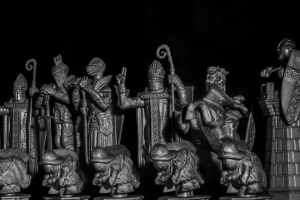

The fall of software patents is very much real. It's all sorts of patents that are affected by the Alice ruling (software patents and business methods being the primary examples), but we wish to focus on software because there is something unique to it, patents being abstract, software being infinitely copyable (copies of copies), and software being reducible to mathematics, making some patents impossible to work around. The other day we saw this effort to re-examine patents. "US Patent and Trademark Office will issue reexamination certificates rejecting all claims in US patents 7,138,061, 7,381,327 and 7,410,571." Biotage is fighting against patents that have been used against it, so there is certainly some eagerness to challenge US patents right now. Many do, in fact, get invalidated at the end. Patents are therefore declining in terms of their value, as we shall show tomorrow in a separate article.
"There is much to celebrate here."As always, one can immediately tell how nervous the parasites are becoming based on lawyers' firms with their responses or 'damage control'. It's all over the place, especially in lawyers' news and analysis sites, e.g. [1, 2, 3, 4, 5, 6, 7, 8, 9, 10, 11].
The National Law Journal went with the headline "It's a 'Scary' Post-'Alice' World for Software Patents". To quote a key paragraph: "In the year since the seminal U.S. Supreme Court ruling in Alice v. CLS Bank International, courts and the U.S. Patent and Trademark Office increasingly have nullified inventions involving computers or the Internet. Robert Sachs, a San Francisco intellectual property partner in Fenwick & West, has studied the trend."
"Another Software Patent Falls to 'Alice'," said another headline from The Recorder.
The Williamson/Citrix case, or "Williamson v. Citrix Online" as some might refer to it in the future, is quite important, albeit not as important as the Alice case (Alice Corp. v. CLS Bank) because it's not a SCOTUS ruling.
Check out the headline from patent maximalists: "The trend is clear in the US, says leading observer: software patent protection is diminishing – and fast" (faster than we could ever dream of).
When the worst patent maximalists, IAM, publish "software patent protection is diminishing – and fast", it really does mean something.
There is much to celebrate here. It is truly another barrier for software patents in the US and as Fenwick & West LLP put it, "Federal Circuit Creates New (Non-Alice) Hurdle For Software Patents". These patent lawyers (Fenwick & West LLP) also wrote that the "Supreme Court rebukes Federal Circuit on patent inducement".
Other patent lawyers' sites took a 'hopeful' approach, going with headlines such as "Hope for Computer-Related Patents". This is another law firm with selective reporting and cherry-picking, designed to shift attention to cases that are favourable to their agenda.
They quote Justice Kimberly Moore, U.S. Court of Appeals for the Federal Circuit, as saying: “Let's be clear: if all of these claims, including the system claims, are not patent-eligible, this case is the death of hundreds of thousands of patents, including all business method, financial system, and software patents as well as many computer implemented and telecommunications patents.”
Yes, indeed. So where is the hope for lawyers?
Alice was recently cited in this high-profile case which makes a headline again. It says that a "group of computer-based technology patent holders told the U.S. Supreme Court to hear Ultramercial Inc.'s appeal of a decision that invalidated its online advertising patent as an abstract idea, saying the high court must clarify the standards for analyzing whether an idea qualifies as abstract."
This isn't actually about computer scientists; rather, these are "computer-based technology patent holders," which basically means a bunch of folks defending their own wealth.
Regarding business methods, an article titled "The status of business method patents" was recently published, saying that "Alice v. CLS Bank dealt a blow to business method patents."
"Business method patents have a checkered history," they claim. "They were once very much in vogue—numerous such patents issued, and many of them were litigated. Then, about two years ago, Congress enacted a special procedure that made it easier to challenge business method patents in the U.S. Patent and Trademark Office (USPTO). Then, in June 2014, the Supreme Court case Alice v. CLS Bank dealt a blow to business method patents."
Patent boosters keep complaining about Alice. They are distracted and they acknowledge that "the IP licensing market slowed down in 2014".
Quoting the opening bits from patent maximalists: "This uncertainty is due to a number of well publicized factors. The industry spent the first half of 2014 awaiting the Supreme Court’s decision in the controversial Alice v. CLS Bank decision. Once the Court announced its decision in June 2014, the industry spent the second half of the year analyzing its impact, particularly its impact to the Inter Partes Review process. Although the IPR provision in the America Invents Act admirably intended to increase efficiency by weeding out patents that shouldn’t have been issued, it has instead dramatically decreased efficiency and disrupted the objective patent valuation methods historically used throughout the industry."
Well, that surely is a good thing, unless one is a patent lawyers like the majority of the voices above. At least they too are admitting that there is considerable impact after Alice. When even the biggest patent maximalists are willing to admit that software patents are in trouble, then surely software patents are in trouble. ⬆